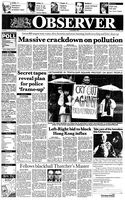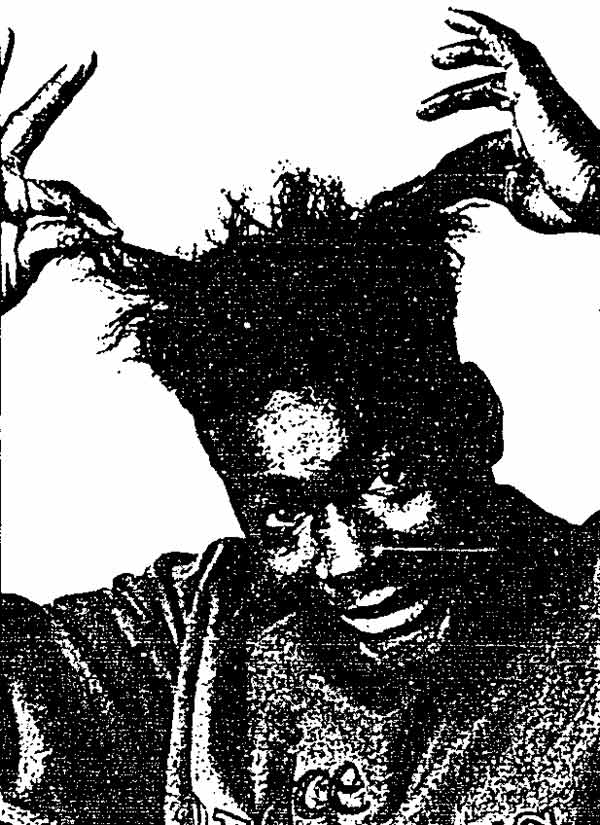| House-proud | |
 |
The Observer 17th December 1989 Page: 9 |
 Techno-beat may have played itself out in the capital, but in Manchester it's the rhythm which has sparked a working-class musical revolution. LEN BROWN reports from the city's dance floors NOWADAYS, it's called 'Mad-chester', where hits are born, where the clubs are packed, and where the techno-beat of house hysteria is as incessant as the rain. If seeing is believing, then Manchester is where it's happening. 'Small cities are where it happens,' says Tony Wilson, head of the city's Factory Records. 'Memphis in '56. Liverpool in '63. San Francisco in '67. Manchester in '76. And Manchester again in '89!' Manchester has certainly been extraordinarily influential since punk: from the Buzzcocks and Joy Division through New Order, The Smiths and Simply Red, to today's crop of lippy, house-proud Mancunians. In the last month, the airwaves have been dominated by sounds like 'Pacifc State' by 808 State, 'Fool's Gold' by the Stone Roses and 'Hallelujah' by the Happy Mondays - all cuts of hard dance music that owe as much to club culture as to white rock. Traditional categories such as indie, rap, soul and acid house have failed to maintain the city's new music, and the consequent breakdown of barriers between rock band and dance floor has happened in its thriving warehouse scene. Manchester's established clubs like the Hacienda, Thunderdome and now Conspiracy exert a profound influence on musical developments. Open-minded DJs like Hacienda's Mike Pickering continue to promote house sounds though London pundits declare it old-fashioned. This has resulted in some of the most radical crossover records of the late Eighties, with the house movement absorbing indic hands and encouraging them to experiment with dance floor technology. Martin Price of 808 State, whose 'Pacific State' is a club classic of '89 and whose LP, Ninety, sets the tone for the new decade, says: 'Manchester is now Britain's dance capital. In London, it's just clubs that are successful with no acts, whereas music made in Manchester is now rocking Chicago. We make 'em dance, it's as simple as that.' It was only in the last year that the city's new wave burst out of the underground and on to mainstream radio. 'Voodoo Ray', a hypnotic piece of house music, reached the Top 20 without Radio 1 airplay. Gerald Simpson, who co-wrote 'Pacific State', says: 'People here are willing to experiment. You get the Happy Mondays and Stone Roses going to acid nights at the Hacienda, and bands like James and Inspiral Carpets getting house people to remix their records. London's too hip a place, too fragmented.' As owner of Manchester's influential Eastern Bloc record shop, Martin Price pioneered the import of classic cuts from the United States and Europe, and introduced Black Box's 'Ride On Time' to the British club scene. Eastern Bloc, like the heaving aircraft hangar-cum community centre, Hacienda, has long been an important meeting point of what has been simplistically defined as the 'white rock' and 'black dance' posses. Designer-businessman Wilson, who is responsible for promoting both New Order and Happy Mondays, says: 'Maybe '85 was a bit dull in Manchester but even then we had The Smiths. It's just lucky old Manchester. The people who are successful stay in town and put something back into the city - unlike Liverpool where, if you make it, you leave.' With Hacienda (also owned by Factory) still firmly at the centre of the movement, the proudly Mancunian Wilson sees the city as the heart of a musical revolution. 'It's an enormous class thing. Apart from Elvis in '56, it's the first working-class revolution; 1963 was, by and large, middle class, '67 and '76 were quite art school, but this sound came initially from the clubs of Ibiza, the kind of place people who went to university don't go to for their holidays.' Wilson also feels that the drug ecstasy has played its part in this revolt: 'Manchester's got a very strong drug tradition. It's this combination of techno-dance music and the discovery of this drug - which was seen as a middle-class aphrodisiac in the early Eighties - that makes you dance all night. Every weekend in Manchester now it's pure hysteria!' The city's rock-meets-dance movement fashionably seems to combine elements of the past with the technological sound of the future. As Wilson explains, 'There's Happy Mondays threatening to cover "Staying Alive", referring back to The Beatles and working with characters as diverse as Karl Denver (who had a hit in '62 with 'Wimoweh') and top London House producer Paul Okenfould. There's the Stone Roses with their Herman's Hermits haircuts and their 12-inch flares. There's 808 State with their northern soul-style obsession with dance.' And hot on their heels are the second wave of dancing Mancunians like Northside, P Love & Blue, Paris Angels, Social Kaos and New Fast Automatic Daffodils, being pushed by local labels such as Play Hard, Scam and Playtime. Maybe the fact that the city has the largest student population in Western Europe in relation to its size helps promote such productivity, but undoubtedly the success of the current revolution has been built on the support of the young people of Manchester and its suburbs. [Author: LEN BROWN] |
|